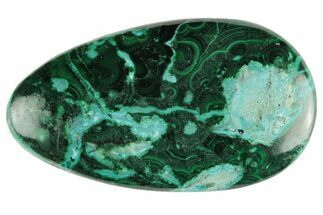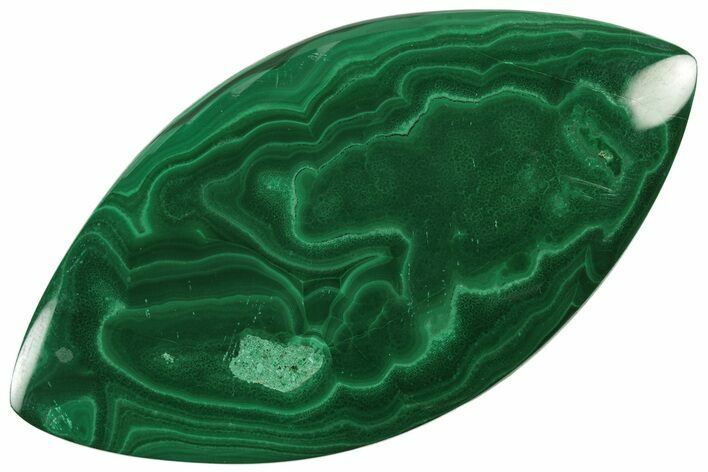This Specimen has been sold.
2.6" Polished Malachite Cabochon
This is a colorful, 2.6" long malachite cabochon. The material was collected from Congo and has been polished to a glossy finish.
About Malachite
Malachite is an intense green copper-based mineral that can be found in a wide variety of forms. Malachite can grow in botryoidal masses, stalactitic formations, and reniform formations, typically as a tight cluster of fanning fibrous needles that make up a seemingly solid mass. As layers continue to stack during formation, banded patterns can sometimes begin to take shape, explaining the rings in all shades of green seen on most polished malachite specimens.
Malachite results from the weathering of other copper ores, and is very often found associated with other copper-based minerals such as azurite and chrysocolla. It can be found in copper deposits around the world, but the Democratic Republic of the Congo is the primary source for polished malachite and mineral specimens.
Malachite has been prized since ancient times, first as a utilitarian copper ore, then as an ornamental stone. Due to its value as a decorative stone, it is rarely mined as a copper ore anymore.
Malachite is an intense green copper-based mineral that can be found in a wide variety of forms. Malachite can grow in botryoidal masses, stalactitic formations, and reniform formations, typically as a tight cluster of fanning fibrous needles that make up a seemingly solid mass. As layers continue to stack during formation, banded patterns can sometimes begin to take shape, explaining the rings in all shades of green seen on most polished malachite specimens.
Malachite results from the weathering of other copper ores, and is very often found associated with other copper-based minerals such as azurite and chrysocolla. It can be found in copper deposits around the world, but the Democratic Republic of the Congo is the primary source for polished malachite and mineral specimens.
Malachite has been prized since ancient times, first as a utilitarian copper ore, then as an ornamental stone. Due to its value as a decorative stone, it is rarely mined as a copper ore anymore.
 Reviews
Reviews












